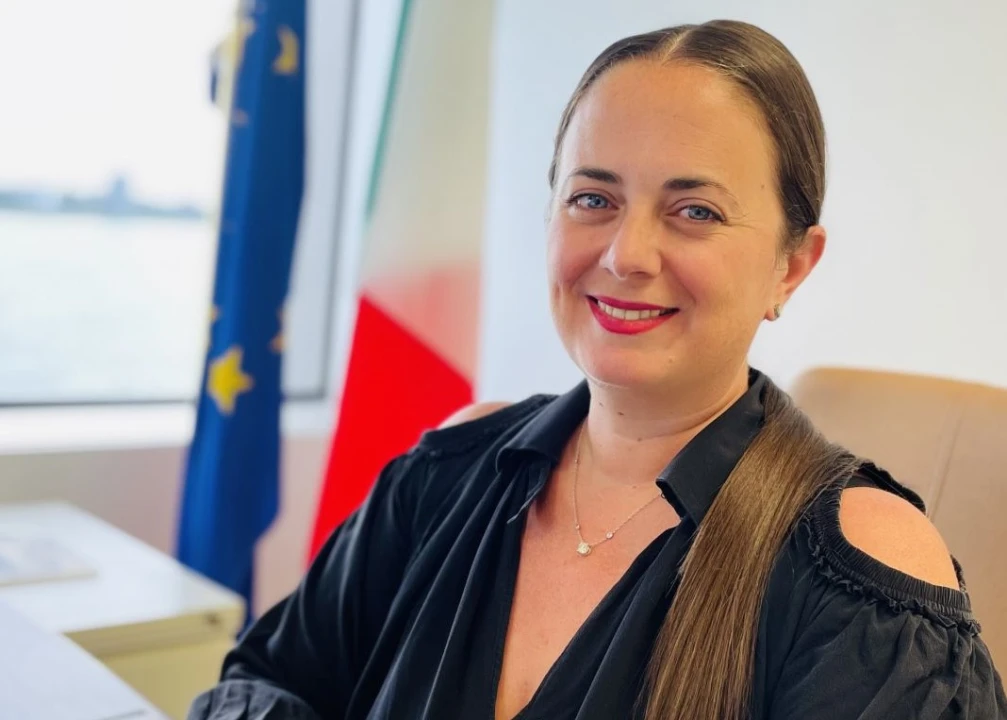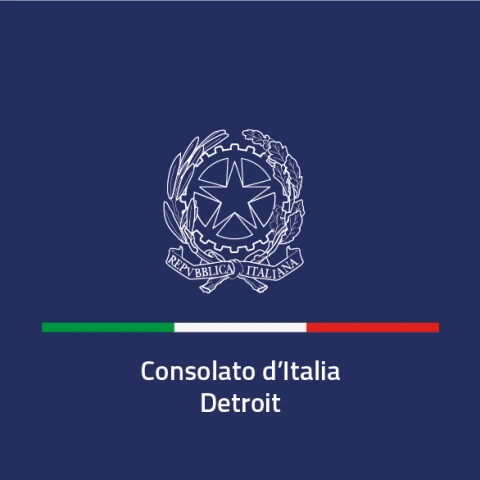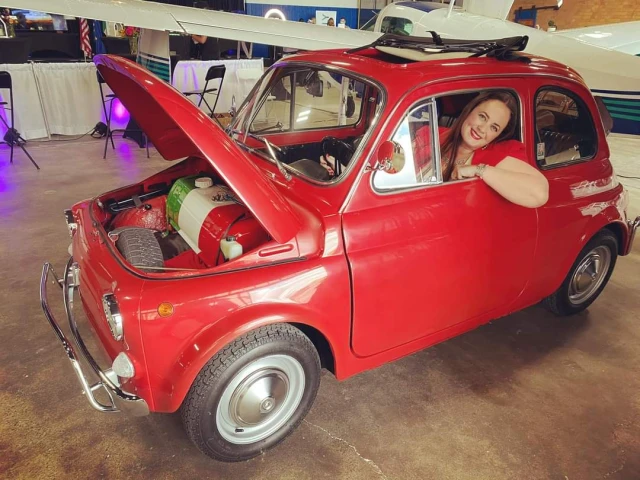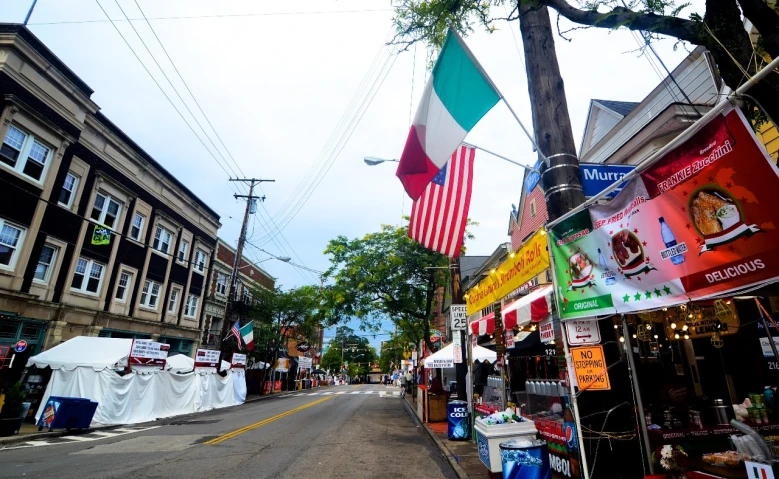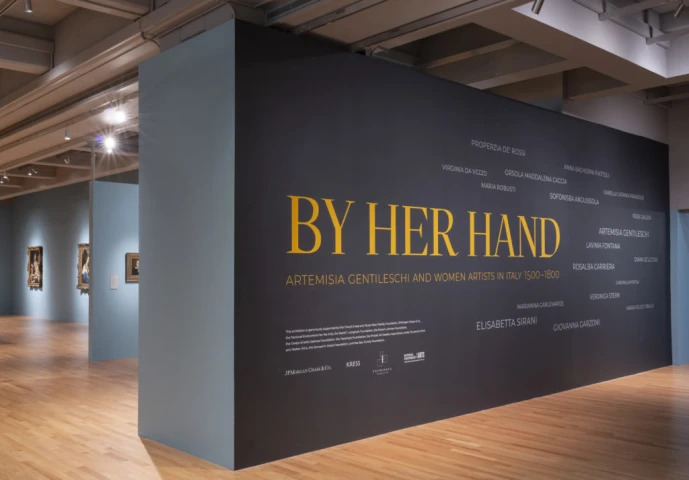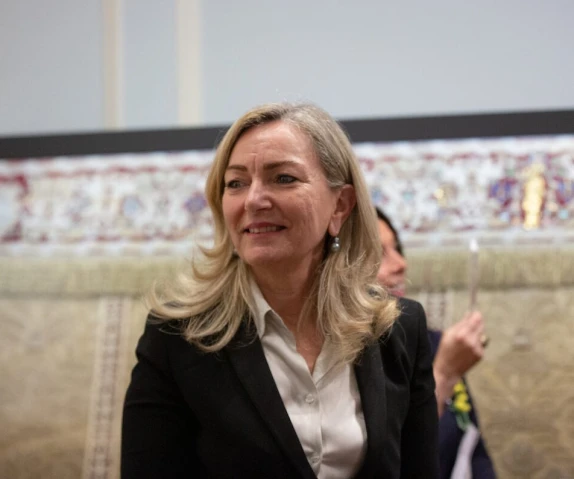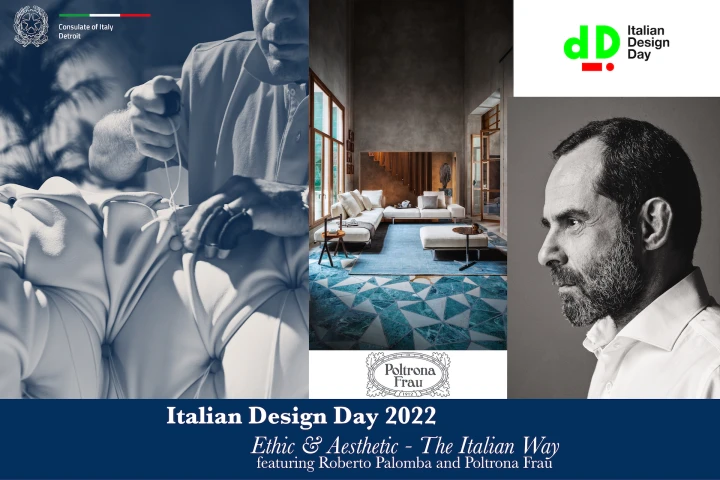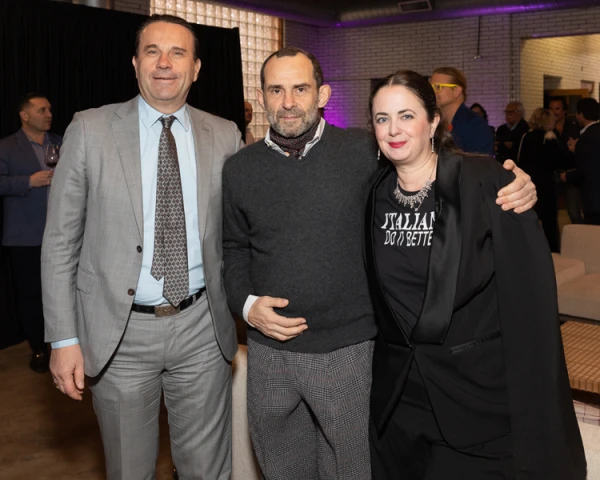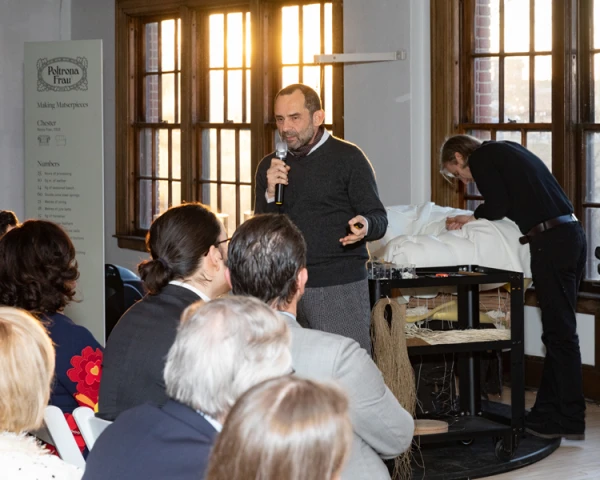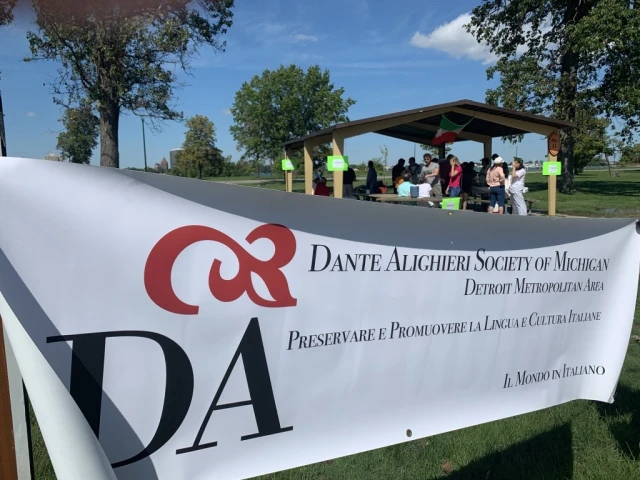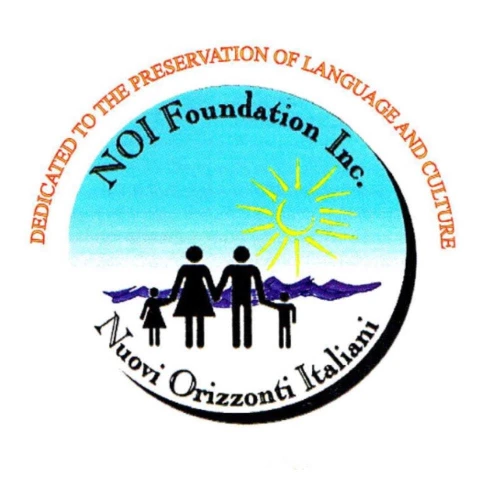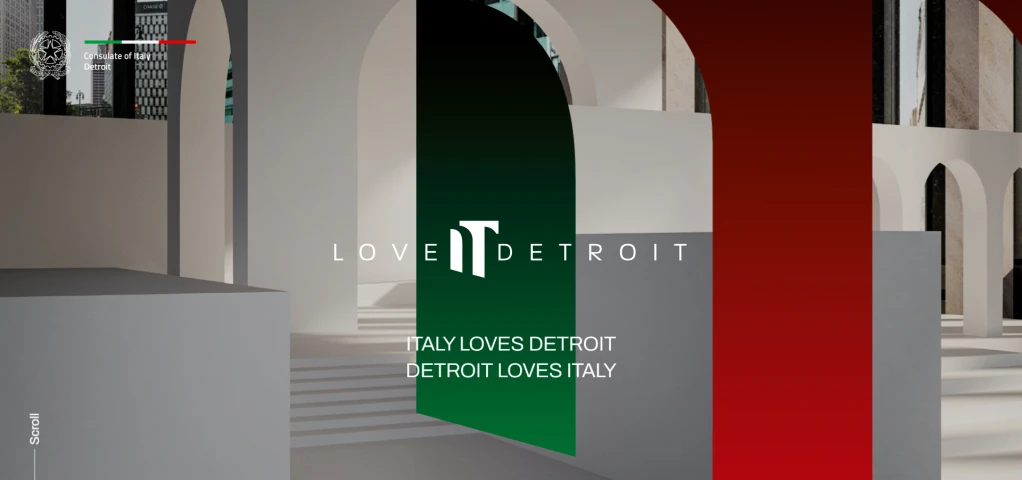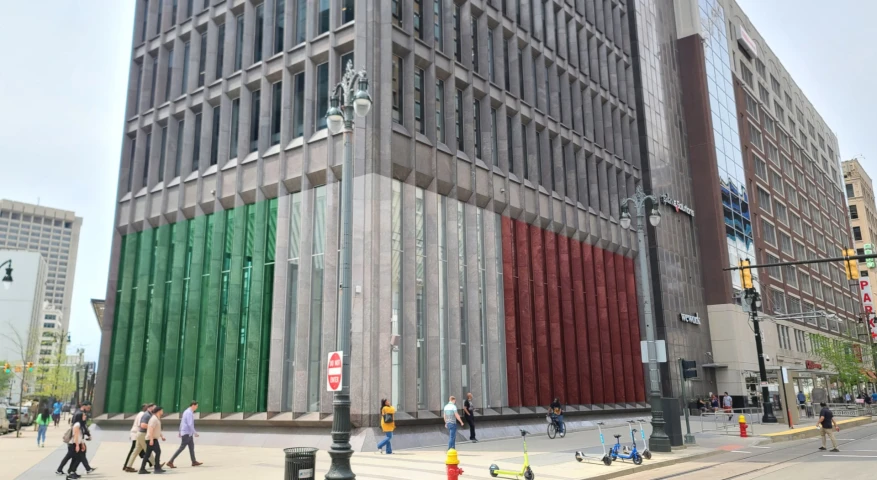Italy continues to send our best diplomats to the United States, to represent our interests and excellence in the various American cities where there is an Italian Consulate.
We are always happy and proud to meet the Consuls who are appointed by the Foreign Ministry here in Rome, and in this interview we meet the Italian Consul in Detroit, Michigan. Allegra Baitrocchi is competent, personable and enthusiastic. We the Italians thanks her for her activity and Italian-ness, and for her courtesy in answering our questions.
Consul Baistrocchi, you have been in charge of the Italian Consulate in Detroit for less than a year. Did you choose Detroit specifically?
Let me start by saying that Detroit was my first choice of posting, which is saying a lot when you have almost the whole world to choose from. And why Detroit? Because I did my homework and found out that Detroit has a lot to offer. It is a super vibrant city in which you can find anything cultural at any time: from great street graffiti to the Detroit Institute of Art (one of the best museums in the country, and not just for their collection of Italian masters or for their incredible exhibits, like their most recent one on Artemisia Gentileschi and the women painters of the 1500-1800); you can find amazing small concerts of jazz or rap or go to the Detroit Opera House or the Detroit Symphony. Detroit is effervescent but often overlooked.
Then there was the business aspect. Great Italian companies represented here and an incredible business community that comes with the territory. There are strong economic ties between Michigan and Italy, we are their second European partner in terms of trade. Investment wise, from data collected by the Michigan Economic Development Corporation, the average investment of Italian companies between 2017-2021 was 26.9m$. So there is already a strong presence, but there is also huge potential to increase these ties exponentially.
And with this already fortunate assignment, I am also able to learn from the best: Ambassador Mariangela Zappia, a trailblazer that has broken ever single glass ceiling and presently the first woman to serve as Ambassador to the USA.
What idea have you had of Italy in Michigan in these months?
I have yet to meet someone that doesn’t love at least one aspect of Italy: the food, the wine, the landscape, the art and the antiquities. It is one of the – if not THE - preferred tourist destination of the Michiganders that I have met. However, if you look beyond the business community to the broader public, many still don’t know how technological and innovative contemporary Italy is.
I always ask people “do you equate Italy with space?”. I then go on to explain that 40% of anything present in the International Space Station is Made in Italy. And I continue in other sectors “did you know that the world’s largest player in renewable energy is Italian and we are the first circular economy in Europe?” … “did you know Italian companies spend more in R&D than any other European country?” … “Did you know that of the top 100 luxury brands, 24 are Italian”… And although many did not know, they are starting to now, and that is why I love what I do…
What are the other States that are part of your Consular district, and what differences have you seen between them?
The jurisdiction of the Consulate of Italy in Detroit is obviously Michigan, but also Ohio, Indiana, Kentucky and Tennessee. Kentucky and Tennesse I have yet to visit, so I cannot speak to those States yet. One thing that I have however seen is the outstanding pride that the Italian and Italian American communities have for our Country. So rather than a difference, that is a unifying fact.
As far as differences go, I think it is more relevant to pockets within States that as a whole. I can give the example of Ohio. Cleveland has a longstanding Italian immigration, a wonderful “Little Italy”, and they have estimated 110,000 Americans of Italian descent in the Cuyahoga county along. I went to Cincinnati and there is a much more recent immigration there, doctors and researchers in the medical field, as well as a younger business community involved in Italian companies tied to automation. So very different communities, but very proud of their origins, whether they be recent or going back generations. And since all of them are incredibly “Italy proud”, I’ve called upon all of them to act as spokespeople to what Italy not only was but is and will be!
The history of Italian emigration to the United States tells us that many Italians settled in the areas under the jurisdiction of your Consulate. Who were these Italians, where did they come from and where did they go in “your” areas?
It is estimated that from 1880 until 1940, over 4 million left Italy for the United States. The growing industry and opportunities of the Great Lakes states and the midwest began drawing many Italian immigrants to the region. Michigan became home to many Italian miners in the Upper Peninsula as well as industrial workers in the burgeoning industrial growth of the years at the close of the 19th Century and the early years of the 20th Century. Ohio cities also became home to tens of thousands of immigrants from all regions of Italy, and the areas that go from Cleveland to Akron to Youngstown are estimated to be 40% of Italian heritage. Northern Kentucky became home to significant numbers of immigrants, as did Tennessee and Indiana. These migrants were largely from Sicily, Abruzzo, Campania and Sardegna.
By the later 20th Century, Italy had achieved its’ economic miracle. Italians no longer were emigrating in large numbers to the United States. Indeed, some Italian Americans were migrating back to the land of their ancestors. As trade and business have become global, many highly skilled and well-educated Italians are resident in the United States as representatives of their business or professions. These individuals are engineers or professionals who are stationed at their company’s American outlets, usually on a temporary basis. Thus, the ties between Italy and the United States have become tighter.
In the 21st Century a large number of young Italians are enriching America by contributing their skills and culture to the betterment of American business and society. This later type of immigration is much more varied, having all regions represented, and with a higher percentage of individuals coming from the northern regions, especially from Torino, giving the strong links with the automotive sector that the city of Detroit holds.
How is Made in Italy doing in the areas of your competence? Is there room for new products and new Italian companies?
Did you know that Detroit is the only UNESCO city of design in the United States? The links between Italy and Detroit are just beginning to see the potential and I am very much focusing on Made in Italy. There has been a recent trend from Italy focusing on Detroit: Bottega Veneta had their global fashion show here last October; Gucci is about to open their flagship downtown; other brands which I cannot name are also coming to town… And where fashion goes, others follow.
We knew of the great interest that Italian products have here and decided that our Italian Design Day in March would feature world renowned Architect Roberto Palomba, who is also a designer of some of the best products to come out of our Country by brands such as Poltrona Frau, Kartell, Foscarini, Flos, etc etc. Instead of 1 event we had 5, each geared to a different audience. The response was outstanding. From students to members of the local elite, everyone has asked us for more. And that is what we are going to give them in September.
The Italian language is fundamental in the narration of the culture but now also of the commerce that comes from our country. I know that in Michigan there is a chapter of the Dante Alighieri Society that is very active...
Let it be known that Italian is the 4th most taught language in the world (it is only the 6th in the US, so we could do a little better on this front). This fact alone is incredible considering our Country is only 0.5% of the global territory. So why is that so?
Italy has always been the cradle (today we could say the “incubator”) of an amazing creativity, a great passion for life and for its aesthetic celebration: the majestic beauty of ancient Rome and the Florence of Dante, Michelangelo and Raffaello; the peculiarities of landscapes shaped by centuries of collective work, which have brought the goodness of Italian cuisine and wine, the birth of opera and classical music, the art in the production of design objects and artistic crafts. The Italian language is integral in being able to understand all of this. But moreover, it is an incredibly beautiful language.
And as we all know, and has been extensively documented in the literature, cultural proximity has a remarkable influence on bilateral trade flows. Language and culture are tools for commerce. This is why I place so much emphasis on cultural promotion.
I am so proud of our Michigan Chapter of the Dante Alighieri Society. They are truly an incredible group of women (there is a lot of “girl power” in Detroit!) lead by President Lia Adelfi. I call them my “partners in crime” in all things Italian, because they really do so much in terms of initiatives and cultural promotion. So a big “grazie” to them for all that they do!
I also have a wonderful NOI Foundation, through which the Italian government funds the promotion of the Italian language classes in over 30 schools (at a high school and middle school level). This is especially important to those 2 and 3 generation Italians, allowing for grandchildren to speak to their nonni in their native tongue and reconnecting them to their roots.
The last two and a half years have been terrible. You came to Detroit in the middle of the pandemic, and I imagine it wasn't easy. Are usual activities and what we use to call “normal life” starting up again, or is it still too early?
The Consulate in Detroit never closed during the Pandemic, even during the lockdown, so the Consulate was able to assist and support where necessary, especially in the most difficult moments. Having started my tenure on September 1st, I was fortunate to arrive when many of the restrictions had been lifted, and there was a genuine interest of people to reconnect in person. I think that it was vital for me to meet relevant officials, institutions, companies and members of the community, because it is through these relations that my job can be carried out. But it’s a “new normal”, with protocols in place, to help balance on the one hand the desire to gear up interactions, and on the other hand to limit potential exposures amongst staff.
What plans are there in the future of the Italian Consulate in Detroit?
To continue what we do best. The Consulate’s essence is divided in two, on the one hand to provide services and assistance to the Italian community, and on the other hand, to promote Italian culture and business. Luckily, the staff at the Consulate is absolutely outstanding, which allows me to focus more on the latter of the two. This year we have 25 events in the books, everything from concerts to literature to cuisine by ways of cinema and art. But the project I am most proud of it: Love IT Detroit (and you can have a sneak peek at www.loveitdetroit.com). It will be a platform through which to convey the more contemporary idea of Italy that I mentioned before.
For the whole month of September we will have a fabulous installation designed by Architect Palomba in the premier space in downtown Detroit (1001 Woodward, generously granted to us by Bedrock). It will be populated with some of the most incredible Made in Italy products, and we will have sectoral events with speakers from Italy as well as local stakeholders. In parallel to the event to be held in Detroit, there will be a highly engaging virtual exhibition - where the virtual and real world interact.
The Love IT Detroit Metaspace, created by Wedoo (an international innovation company with offices in Turin and Rome, but also here in Michigan), will be a digital twin of the physical environment and is built using a platform developed in Unreal Engine (the same technology used for famous video games such as Fortnite), which will allow guests to "live" an immersive and interactive experience, exploring the key underlying themes. With 24/7 access, visitors will be able to visit the virtual space, interacting with the exhibitions and brands at their own pace, and at the same time this will make the event truly global and accessible to all.
It doesn’t end there. We have a lot more in store. We want to see more @ItalyInDetroit (that is our social media handle, and I would love it if all your readers could follow us to find out more about what we have in store) but it’s also very much about more Detroit in the world. Let’s build more bridges, in highly experiential, collaborative, passion fueled, multidimensional, multisensory, extraordinary ways!
L'Italia continua ad inviare i nostri migliori diplomatici negli Stati Uniti, a rappresentare i nostri interessi e le nostre eccellenze nelle diverse città americane dove c'è un Consolato italiano.
Siamo sempre felici e orgogliosi di incontrare i Consoli che vengono nominati dal Ministero degli Esteri qui a Roma, e in questa intervista incontriamo la Console italiana a Detroit, in Michigan. Allegra Baitrocchi è competente, simpatica ed entusiasta. We the Italians la ringrazia per la sua attività e la sua italianità, e per la sua cortesia nel rispondere alle nostre domande.
Console Baistrocchi, lei è a capo del Consolato italiano di Detroit da meno di un anno. Ha scelto lei Detroit?
Vorrei iniziare dicendo che Detroit è stata la mia prima scelta di sede, il che la dice lunga quando si ha quasi tutto il mondo a disposizione. E perché Detroit? Perché ho fatto i compiti a casa e ho scoperto che Detroit ha molto da offrire. È una città super vivace in cui si può trovare qualsiasi cosa di culturale in qualsiasi momento: dai grandi graffiti di strada al Detroit Institute of Art (uno dei migliori musei del Paese, e non solo per la sua collezione di maestri italiani o per le sue incredibili mostre, come quella più recente su Artemisia Gentileschi e le donne pittrici del 1500-1800); si possono trovare piccoli concerti sorprendenti di jazz o rap o andare alla Detroit Opera House o alla Detroit Symphony. Detroit è effervescente ma spesso trascurata.
Poi c'è stato l'aspetto commerciale. Qui sono rappresentate grandi aziende italiane e un'incredibile comunità imprenditoriale che fa parte del territorio. Esistono forti legami economici tra il Michigan e l'Italia, siamo il loro secondo partner europeo in termini di scambi commerciali. Per quanto riguarda gli investimenti, dai dati raccolti dalla Michigan Economic Development Corporation, l'investimento medio delle aziende italiane nel periodo 2017-2021 è stato di 26,9 milioni di dollari. Quindi c'è già una forte presenza, ma c'è anche un enorme potenziale per aumentare esponenzialmente questi legami.
E con questo già fortunato incarico, ho anche la possibilità di imparare dai migliori: l'Ambasciatore Mariangela Zappia, un'apripista che ha infranto ogni singolo soffitto di cristallo e attualmente è la prima donna a ricoprire la carica di Ambasciatore negli Stati Uniti.
Che idea si è fatta dell'Italia in Michigan in questi mesi?
Non ho ancora incontrato qualcuno che non ami almeno un aspetto dell'Italia: il cibo, il vino, il paesaggio, l'arte e le antichità. È una delle - se non LA - destinazione turistica preferita dai cittadini del Michigan che ho incontrato. Tuttavia, se si guarda al di là della comunità imprenditoriale e al pubblico in generale, molti non sanno ancora quanto sia tecnologica e innovativa l'Italia contemporanea.
Chiedo sempre alle persone: "Lei equipara l'Italia allo spazio?" Poi spiego che il 40% di tutto ciò che è presente nella Stazione Spaziale Internazionale è Made in Italy. E continuo in altri settori "lo sapevate che il più grande player mondiale nelle energie rinnovabili è italiano e che siamo la prima economia circolare d'Europa?" "Lo sapevate che le aziende italiane spendono in R&S più di qualsiasi altro Paese europeo?" "Sapevate che tra i primi 100 marchi del lusso, 24 sono italiani?" E anche se molti non lo sapevano, ora iniziano a saperlo, ed è per questo che amo quello che faccio.
Quali sono gli altri Stati che fanno parte della sua circoscrizione consolare e quali differenze ha riscontrato tra loro?
La giurisdizione del Consolato d'Italia a Detroit è ovviamente il Michigan, ma anche Ohio, Indiana, Kentucky e Tennessee. Il Kentucky e il Tennessee non li ho ancora visitati, quindi non posso ancora parlare di quegli Stati. Una cosa che ho potuto constatare è l'eccezionale orgoglio che le comunità italiane e italoamericane hanno per il nostro Paese. Quindi, più che una differenza, è un fatto unificante.
Per quanto riguarda le differenze, credo che siano più rilevanti le comunità all'interno degli Stati che l'insieme. Posso fare l'esempio dell'Ohio. Cleveland ha una lunga immigrazione italiana, una meravigliosa "Little Italy", e si stima che ci siano 110.000 americani di origine italiana nella contea di Cuyahoga. Sono stata a Cincinnati, dove l'immigrazione è molto più recente, con medici e ricercatori nel campo della medicina, e una comunità imprenditoriale più giovane coinvolta in aziende italiane legate all'automazione. Quindi comunità molto diverse tra loro, ma molto orgogliose delle loro origini, sia recenti che di generazioni precedenti. E poiché tutti loro sono incredibilmente "orgogliosi dell'Italia", li ho chiamati a farsi portavoce di ciò che l'Italia non solo era, ma è e sarà!
La storia dell'emigrazione italiana negli Stati Uniti ci dice che molti italiani si sono stabiliti nelle aree sotto la giurisdizione del vostro Consolato. Chi erano questi italiani, da dove venivano e dove sono andati nelle "vostre" zone?
Si stima che dal 1880 al 1940 oltre 4 milioni di persone abbiano lasciato l'Italia per gli Stati Uniti. L'industria e le opportunità in crescita degli Stati dei Grandi Laghi e del Midwest iniziarono ad attirare molti immigrati italiani nella regione. Il Michigan divenne la patria di molti minatori italiani nella Penisola Superiore e di lavoratori industriali nella fiorente crescita industriale della fine del XIX secolo e dei primi anni del XX secolo. Le città dell'Ohio ospitarono anche decine di migliaia di immigrati provenienti da tutte le regioni d'Italia, e si stima che le aree che vanno da Cleveland ad Akron a Youngstown siano per il 40% di origine italiana. Il Kentucky settentrionale ospitò un numero significativo di immigrati, così come il Tennessee e l'Indiana. Questi immigrati provenivano in gran parte dalla Sicilia, dall'Abruzzo, dalla Campania e dalla Sardegna.
Alla fine del XX secolo, l'Italia aveva raggiunto il suo miracolo economico. Gli italiani non emigravano più in gran numero negli Stati Uniti. Anzi, alcuni italoamericani stavano tornando nella terra dei loro antenati. Poiché il commercio e gli affari sono diventati globali, molti italiani altamente qualificati e ben istruiti risiedono negli Stati Uniti come rappresentanti delle loro aziende o delle loro professioni. Si tratta di ingegneri o professionisti che risiedono nei punti vendita americani della loro azienda, di solito su base temporanea. I legami tra Italia e Stati Uniti sono quindi diventati più stretti.
Nel XXI secolo, un gran numero di giovani italiani sta arricchendo l'America contribuendo con le proprie competenze e la propria cultura al miglioramento delle imprese e della società americane. Questo secondo tipo di immigrazione è molto più variegato, con tutte le regioni rappresentate e con una percentuale maggiore di individui provenienti dalle regioni settentrionali, in particolare da Torino, dato il forte legame con il settore automobilistico che contraddistingue la città di Detroit.
Come sta andando il Made in Italy nelle zone di sua competenza? C'è spazio per nuovi prodotti e nuove aziende italiane?
Sa che Detroit è l'unica città UNESCO del design negli Stati Uniti? I legami tra l'Italia e Detroit stanno appena iniziando a vedere il potenziale e io sto puntando molto sul Made in Italy. Recentemente c'è stata una tendenza da parte dell'Italia a puntare su Detroit: Bottega Veneta ha tenuto qui la sua sfilata globale lo scorso ottobre; Gucci sta per aprire il suo flagship in centro; altri marchi che non posso nominare stanno arrivando in città. E dove va la moda, altri la seguono.
Sapevamo del grande interesse che i prodotti italiani riscuotono qui e abbiamo deciso che il nostro Italian Design Day di marzo avrebbe avuto come protagonista l'architetto di fama mondiale Roberto Palomba, che è anche il designer di alcuni dei migliori prodotti usciti dal nostro Paese con marchi come Poltrona Frau, Kartell, Foscarini, Flos e altri. Invece di un solo evento ne abbiamo avuti 5, ognuno rivolto a un pubblico diverso. La risposta è stata eccezionale. Dagli studenti ai membri dell'élite locale, tutti ci hanno chiesto di farne altri. Ed è quello che daremo loro a settembre.
La lingua italiana è fondamentale nella narrazione della cultura ma ora anche del commercio che proviene dal nostro Paese. So che nel Michigan c'è una rappresentanza della Società Dante Alighieri molto attivo...
Si sappia che l'italiano è la quarta lingua più insegnata al mondo (negli Stati Uniti è solo la sesta, quindi potremmo fare un po' meglio su questo fronte). Questo dato è incredibile se si considera che il nostro Paese rappresenta solo lo 0,5% del territorio mondiale. Come mai?
L'Italia è da sempre la culla (oggi potremmo dire l'"incubatrice") di una sorprendente creatività, di una grande passione per la vita e per la sua celebrazione estetica: la maestosa bellezza dell'antica Roma e della Firenze di Dante, Michelangelo e Raffaello; le peculiarità dei paesaggi plasmati da secoli di lavoro collettivo, che hanno portato alla bontà della cucina e del vino italiani, alla nascita dell'opera e della musica classica, all'arte nella produzione di oggetti di design e di artigianato artistico. La lingua italiana è parte integrante per poter comprendere tutto questo. Ma è anche una lingua incredibilmente bella.
E come tutti sappiamo, ed è stato ampiamente documentato in letteratura, la vicinanza culturale ha una notevole influenza sui flussi commerciali bilaterali. La lingua e la cultura sono strumenti per il commercio. Ecco perché attribuisco grande importanza alla promozione culturale.
Sono molto orgogliosa della nostra Società Dante Alighieri del Michigan. È un gruppo incredibile di donne (c'è molto "girl power" a Detroit!) guidato dalla presidente Lia Adelfi. Le chiamo le mie "partners in crime" in tutto ciò che riguarda l'italiano, perché fanno davvero tanto in termini di iniziative e promozione culturale. Quindi un grande "grazie" a loro per tutto quello che fanno!
C’è anche la meravigliosa NOI Foundation, attraverso la quale il governo italiano finanzia la promozione delle lezioni di lingua italiana in oltre 30 scuole (a livello di scuole superiori e medie). Questo è particolarmente importante per gli italiani di seconda e terza generazione, in quanto permette ai nipoti di parlare con i nonni nella loro lingua madre e di ricollegarsi alle loro radici.
Gli ultimi due anni e mezzo sono stati terribili. Lei è arrivata a Detroit nel bel mezzo della pandemia e immagino che non sia stato facile. Le attività abituali e quella che chiamiamo "vita normale" stanno riprendendo, o è ancora troppo presto?
Il Consolato di Detroit non ha mai chiuso durante la pandemia, nemmeno durante l'isolamento, per cui è stato in grado di assistere e sostenere dove necessario, soprattutto nei momenti più difficili. Avendo iniziato il mio incarico il primo settembre del 2021, ho avuto la fortuna di arrivare quando molte delle restrizioni erano state rimosse e c'era un genuino interesse delle persone a riallacciare i contatti di persona. Ritengo che sia stato fondamentale per me incontrare i funzionari, le istituzioni, le aziende e i membri della comunità interessati, perché è attraverso queste relazioni che il mio lavoro può essere svolto. Ma si tratta di una "nuova normalità", con protocolli in atto, che aiutano a bilanciare da un lato il desiderio di intensificare le interazioni, e dall'altro a limitare le potenziali esposizioni del personale.
Quali sono i progetti per il futuro del Consolato italiano a Detroit?
Continuare a fare quello che sappiamo fare meglio. L'essenza del Consolato è divisa in due: da un lato fornire servizi e assistenza alla comunità italiana, dall'altro promuovere la cultura e gli affari italiani. Fortunatamente, il personale del Consolato è assolutamente eccezionale, il che mi permette di concentrarmi maggiormente su quest'ultimo aspetto. Quest'anno abbiamo in programma 25 eventi, dai concerti alla letteratura alla cucina, passando per il cinema e l'arte. Ma il progetto di cui sono più orgogliosa è Love IT Detroit (si può consultare il sito www.loveitdetroit.com). Sarà una piattaforma attraverso la quale trasmettere l'idea più contemporanea dell'Italia di cui ho parlato prima.
Per tutto il mese di settembre avremo una favolosa installazione progettata dall'architetto Palomba nello spazio più importante del centro di Detroit (1001 Woodward, generosamente concessoci da Bedrock). Sarà popolata da alcuni dei più incredibili prodotti del Made in Italy, e avremo eventi settoriali con relatori provenienti dall'Italia e stakeholder locali. Parallelamente all'evento che si terrà a Detroit, ci sarà una mostra virtuale molto coinvolgente, dove il mondo virtuale e quello reale interagiranno.
Il Love IT Detroit Metaspace, creato da Wedoo (società internazionale di innovazione con sedi a Torino e Roma, ma anche qui in Michigan), sarà un gemello digitale dell'ambiente fisico ed è costruito utilizzando una piattaforma sviluppata in Unreal Engine (la stessa tecnologia utilizzata per famosi videogiochi come Fortnite), che permetterà agli ospiti di "vivere" un'esperienza immersiva e interattiva, esplorando i temi chiave di fondo. Grazie all'accesso 24 ore su 24, 7 giorni su 7, i visitatori potranno visitare lo spazio virtuale, interagendo con le mostre e i marchi secondo i loro tempi, e questo renderà l'evento davvero globale e accessibile a tutti.
Ma non finisce qui. Abbiamo in serbo molto di più. Vogliamo vedere più @ItalyInDetroit (questo è il nostro social media handle, e mi piacerebbe che tutti i vostri lettori ci seguissero per scoprire di più su ciò che abbiamo in serbo), ma anche più Detroit nel mondo. Costruiamo più ponti, in modi altamente esperienziali, collaborativi, alimentati dalla passione, multidimensionali, multisensoriali e straordinari!


